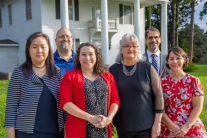During Fall 2024, the Office of Distance Learning celebrated its 50th Quality Matters course certification.
Meet the Instructional Support Team
Fri, 08/12/2022 - 11:10amThe six members that comprise the Instructional Support Team bring decades of teaching, course design and instructional technology experience to our shared goal: creating engaging and interactive online courses alongside faculty, the subject matter experts.
Francesco Crocco, Ph.D., Instructional Support Manager
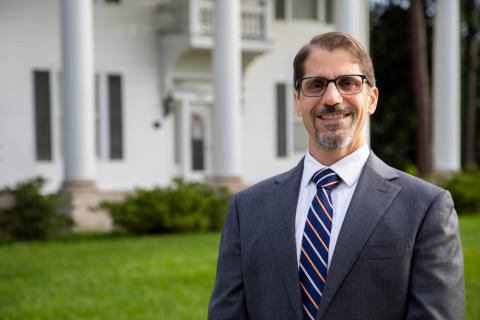 Francesco Crocco brings extensive experience as an educator and researcher in online education, pedagogy, and professional development.
Francesco Crocco brings extensive experience as an educator and researcher in online education, pedagogy, and professional development.
Crocco has been a teaching fellow, lecturer, and associate professor, teaching online and face-to-face courses in literature and composition. He’s also written two books on literature and pedagogy, in addition to several journal publications.
His commitment is to be a resource and advocate for faculty as he leads the Instructional Support Team in providing tools, professional development, and support to online instructors.
“At the end of the day, these are their courses,” he says. “And we need these faculty members in order to provide accessible learning opportunities for UL Lafayette students.”
Reneé Fiser, Instructional Technologist
As part of the Instructional Support Team, Reneé Fiser supports UL Lafayette faculty and staff using EduTools through technical troubleshooting and instructional resources. 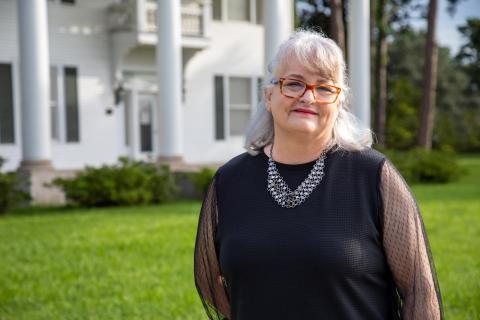
Fiser’s career evolved over 20 years from an educator focused on technology, digital media, and computer literacy to instructional technologist.
“I always loved technology and taught technology courses as a high school teacher. Eventually, I added webmaster and tech support to my duties until I retired from secondary education,” she says. “I went back to school for my master's in Educational Technology before retirement with the hope that I would someday move into higher education as an instructional technologist.”
Having created and taught online and hybrid courses in secondary and post-secondary settings, the Office of Distance Learning provides the opportunity for Fiser to continue growing while encouraging faculty to do the same.
“I get to explore new and existing technologies while supporting faculty and staff in how this technology works and how best to use it,” Fiser says. “I enjoy being a part of such a great team.”
Alise Hagan, Ed.D., Instructional Designer
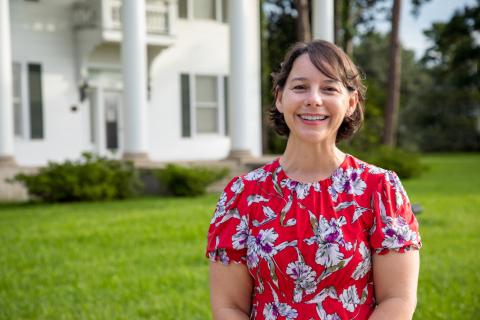 Alise Hagan has spent her career working in higher education in roles from research and training to instructional design, with a consistent focus on supporting faculty.
Alise Hagan has spent her career working in higher education in roles from research and training to instructional design, with a consistent focus on supporting faculty.
“While I have been able to work in different departments — Sponsored Research, Distance Learning, Institutional Assessment — the common thread has been my ability to communicate effectively and build relationships with faculty,” she says.
Hagan was the Office of Distance Learning’s first instructional designer from 2011 to 2014, returning in 2022.
“It's been exciting to see how some of the policies and processes we developed then — like faculty and course certification — are still in use now. Of course, there have been amazing changes and growth, too — from the number of staff to the types of technology and resources available!” says Hagan. “I most enjoy the opportunity to work alongside my colleagues on the Instructional Support Team. This team is highly supportive, creative, and dedicated to providing quality service to our faculty and staff."
Andrea Leonard, Instructional Designer
Andrea Leonard spent several years as a chemistry instructor, teaching online and in person, before joining the Office of Distance Learning. 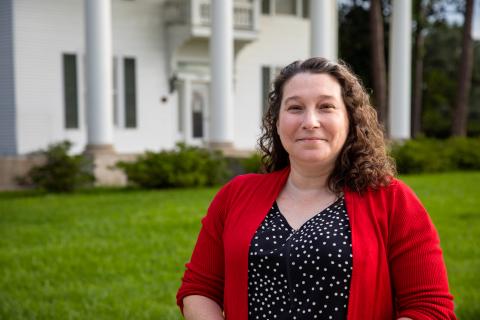
As an instructor, Leonard pioneered adaptive technology at UL Lafayette to create personalized online educational pathways.
“Adaptive technology fosters personalized learning,” Leonard says. “Not everyone will receive the same experience, but everyone will achieve the same learning objectives. It helps learners focus where they need the most help and it won’t overwhelm learners with constant new information if they haven’t yet mastered previous skills.”
In her role, Leonard's goal is to help faculty members get the most out of the courses they’re creating through cutting-edge tools and best practices in online education.
Mike Williams, Instructional Technologist
 Instructional Technologist Mike Williams makes sure those technologies work the way they’re supposed to, when they’re supposed to.
Instructional Technologist Mike Williams makes sure those technologies work the way they’re supposed to, when they’re supposed to.
“As an instructional technologist, my specific role is to manage and support the EduTools,” he says. “When they don’t work, my goal is to figure out why.”
As an instructor at various institutions before coming to Distance Learning, Williams always found he was the “unofficial IT guy,” setting up hardware and helping colleagues troubleshoot software.
When he saw the opportunity to enter a new cross-section of his job duties, he jumped at the chance.
“Folks ask the question of how online education can be as engaging as face-to-face teaching,” he said. “Having been an online student and instructor, I enjoy being able to show faculty that instruction in an online environment can be even more engaging than face-to-face.
“The technology we provide can allow them to do things beyond what they thought was possible in a face-to-face classroom.”
Diana Wu, Ph.D., Instructional Designer
Diana Wu joined the support team from Virginia Tech and says getting down to data through adaptive learning can help create those interventions.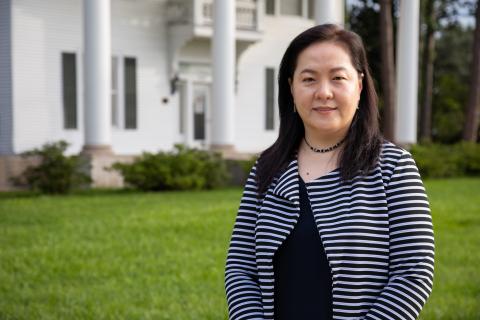
“Compared to face-to-face, there are different technologies for online-based courses to analyze the students’ learning progress,” she says. “If you detect any issue, you can provide support in time to help students succeed.”
Wu says her aim is to be supportive and flexible in providing hands-on support when and wherever possible to ensure a quality online teaching and learning experience.
That has become easier, she says, as more technologies are adopted and integrated into online learning.
“One of the challenges before we had VoiceThread and similar technology, was engaging students and increasing the student-faculty interaction and student-student interactions,” she says. “Now we have many handy technologies we can support to raise engagement, as well as design instruction to motivate engagement and interaction so students do not feel they are by themselves.”
Request a consultation today for a one-on-one meeting with one of our team members to address your course goals and objectives.

